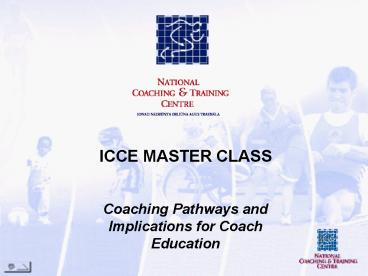ICCE MASTER CLASS - PowerPoint PPT Presentation
1 / 20
Title:
ICCE MASTER CLASS
Description:
deliberate play. Focus on one sport. 3. Elite performance ... Deliberate play and practice balanced. Reduce Involvement in several sports. Recreational Years ... – PowerPoint PPT presentation
Number of Views:59
Avg rating:3.0/5.0
Title: ICCE MASTER CLASS
1
ICCE MASTER CLASS Coaching Pathways and
Implications for Coach Education
2
3. Probable Outcomes Elite performance Reduced
health Reduced enjoyment
1. Probable Outcomes Recreational
participation Enhanced physical health Enhanced
psychosocial development -
2. Probable Outcomes Elite performance Enjoyment
Physical health
Early specialization and investment High amount
of deliberate practice Low amount of deliberate
play Focus on one sport 3. Elite performance
through early specialization
Investment Years High amount of deliberate
practice Low amount of deliberate play Focus on
one sport
Recreational Years High amount of deliberate
play Low amount of deliberate practice
17 16 15 14 13 12 11 10 9 8 7 6
Specializing Years Deliberate play and practice
balanced Reduce Involvement in several sports
- Sampling Years
- High amount of deliberate play
- Low amount of deliberate practice
- Involvement in several sports
- Recreational participation
2. Elite performance through through sampling
sampling
Entry into sport
Côté Fraser-Thomas, in press
3
(No Transcript)
4
Implications
- Pathway-Ladder alignment
- Generic model of LTPAD
- Sport specific
- Definition of Athlete cacacities
- Associated coaching capacities
- Clear understanding of coaching pathways and
coaching expertise
5
Role of the Coach
Early years Middle Years Later years
6
Role of the Coach
Early years - Fun and skill development Middle
Years - Technical and Tactical development Later
years - Guidance and mentoring
Skills learned relationships formed decisions
made
7
Revised Coaching Ladder
8
What are the elements and phases associated with
coaching expertise?
9
ATHLETE CAPACITIES
MENTAL
TACTICAL
TECHNICAL
Be the best I want to be
LIFESTYLE PERSONAL
PHYSICAL
Help you achieve your goals
COACH CAPACITIES
SPORT/PLAYER
STYLE ETHICS
REVIEW
LIFESTYLE PERSONAL
PLANNING
PRACTICE PERFORMANCE
COMMUNICATION
10
Need for a Model of LTCD
- Coaches are central to the development of the
expert performer (Bloom, 1985 Ericsson, 1996) - BUT
- Limited number of studies on how coaches develop
their talent - Need to understand why coaches become involved,
the pathways they follow, the phases they pass
through and the reasons why they stay/leave
coaching - A LTCD model will inform the design and delivery
of coach education and support programmes, which
form an important part of the sports systems of
many countries
11
Ways of Looking at LTCD
- Demographic profile
- Age, sex, race, SES, location
- Career path
- Volunteer, Part-Time, Professional
- Qualification
- None, Professional, Academic
- Target group
- Early, Middle, Late
- Sampling, Specialising, Investment
- Practice Profile
- Hours as a player (multi-sport, specific sport)
- Hours as a coach (multi-sport, specific sport)
- Hours in qualification/formal training
- Other related practice e.g. captain, non-sport
coaching
12
Methodology
- Irish coaches
- Self-administered postal questionnaire
- 127 certified coaches (73 male, 27 female)
- Variety of novice-elite coaches from various
sports - 19 return rate to date follow-up to occur
13
Sample profile
- 75 male, 25 female
- 78 current coaching
- 22 lapsed
14
- 62 reached third level education
- 21 sports related qualification eg PE/sport
science degree
15
Athletic Profile
- 93 were/are athletes
- Average 2 sports per respondent
- 52 captains/assistant
- captains
16
Athletic Profile (ctd)
Coaches spent an estimated 2,469 hours playing
sport as an athlete/player
Coaches accumulate many years of experience as
an athlete Bloom (2002) Gilbert et al. (2002,
2003) Hardin (2000) Schinke, Bloom Salmela
(1995)
17
Coaching Profile
18
Athlete Coach transition
DPA Deliberate Practice (Athlete) DPC Deliberat
e Practice (Coach)
DPC
No. of hours (hrs)
Attend
Decide
DPA
Start
Age (yrs)
19
LTCD phases?
Sport initiation (sport mastery) Apprentice Techn
ician Master
20
ICCE MASTER CLASS Coaching Pathways and
Implications for Coach Education































